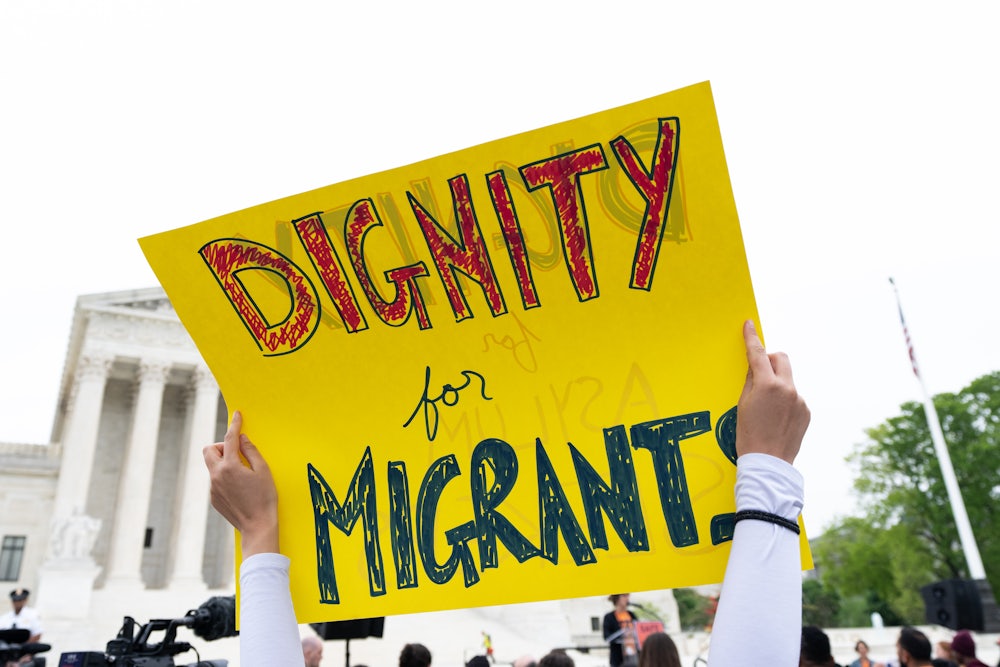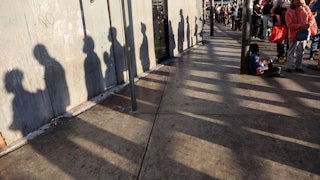The 53 men, women, and children who perished after being left in the darkness and stifling heat of a tractor-trailer abandoned on the side of a road in San Antonio this week had twin objectives: reaching the United States and, with it, finally achieving personal safety. In the end, they would achieve only the former, and it would be their death sentence.
There are many harsh policies that have forced immigrants and asylum-seekers into such unsafe conditions. On Thursday, the Supreme Court paved the way for the end of one of them. In a 5–4 decision, the court ruled that President Joe Biden can end the controversial “Remain in Mexico” program. Also known as the Migrant Protection Protocols, the immigration policy implemented by President Donald Trump has sent tens of thousands of immigrants seeking asylum in the U.S. to Mexico to remain there—typically in unsafe, squalid conditions—while their immigration proceedings play out.
After the tragedy in San Antonio, Republicans jumped to lay blame at the feet of the Biden administration, displaying their Schrödinger’s empathy for the plight of migrants, which either exists or does not exist depending on whether it can advance their political aims of ever-tighter restrictions at the border. Texas Governor Greg Abbott, who allegedly drove several National Guard troops to suicide by conducting an extended and pointless state-level “border security” operation as part of his never-ending presidential campaign, was quick to assert that the deaths were the result of Biden’s “deadly open border policies,” a revolting dodge repeated by assorted Trumpworld flunkies like MAGA Senator Marsha Blackburn.
The fundamental truth that they ignore in calling for harsher and harsher border enforcement and more and more limits on access to the legal asylum system is that, for a significant portion of the people making such a trek, it’s a measured decision in much the same way that slamming the brakes at an intersection while a truck rolls through a red light across from you is a measured decision. You didn’t cause the situation that’s putting you at risk, and you can’t guarantee that another driver won’t slam you from behind or you won’t spin out into a ditch or whatever else, but all of it seems inordinately safer than just staying the course and taking your chances with the careening 15 ton vehicle. In that moment, additional risk factors stop mattering as much. You won’t check the number of cars behind you, or whether the roadsides have sturdy barriers, because running head-on into the truck almost certainly means death and all other scenarios might not.
For a person in Guatemala or Mexico or Sudan who has been directly and credibly threatened with rape or murder or is under suffocating persecution by the state, that is the one overarching emergency, and escape to safety will become the imperative above all. A sizable number do not and will never place the ever-shifting restrictions to legal asylum or the warnings of faraway political leaders above the basic drive to leave danger and head to a place that, according to all the mass media and culture they’ve been fed for generations, is the land of freedom and opportunity and safety.
There is no amount of restrictionism that will outweigh a desire to flee mortal danger, no barbarity that will rise to the level of true dissuasion unless we just start opening fire on asylum-seekers, a measure many on the far right—with their military cosplay and enthusiasm for troops on the border—appear ready to embrace but which one has to hope will never come about. Short of that, every additional obstacle becomes one more barrier that migrants can die trying to overcome as they cross through remote desert areas of the border region or pay amoral smugglers when they would have preferred just to turn themselves in at a port of entry, if only the government would observe their right to seek asylum.
This will only get worse as climate collapse accelerates and drives conflict and scarcity around Central and South America. In El Salvador, the autocratic tech bro President Nayib Bukele, who is busily dynamiting the national economy with an ill-advised and already-disintegrating bet on Bitcoin, is setting the stage for further outflows. Ironically, the same climate change that will drive many to leave their increasingly uninhabitable homes will make their journeys toward the U.S. more perilous. Temperatures around San Antonio, where this semi-truck tragedy unfolded, reached record highs this summer. What killed the men, women, and children inside was dehydration and heat stroke, conditions directly downstream from the scorching temperatures outside. It’s impossible to say with certainty whether a milder summer would have saved their lives in this particular case, but what can be definitively said is that extreme weather in general, paired with the litany of restrictions that have increasingly shut off access to the humanitarian migration system that exists on paper, can, have, and will lead directly to deaths like these.
That’s not speculation or simplification, it’s already an observable fact. Deaths have increased as migrants are pushed to more remote crossings that are more arid and inhospitable by the day. They are courted by cartels and smugglers who purport to guarantee an entrance to the U.S., including for those who’ve already been expelled or turned back. To its credit, the Biden administration has slowly come to realize this and, finally, acted to turn back some Trump-era restrictions, notably Title 42, a public health statute exploited to expel migrants before they could even tender asylum claims, and the Remain in Mexico policy at the center of Thursday’s ruling in the Supreme Court.
Until Thursday, the administration had been blocked by Trump-appointed district judges from fully ending both programs. With the Supreme Court’s ruling on Remain in Mexico, there is a path forward for the end of this dangerous policy. Without getting too much into the legal wrangling, Scotus punted the lawsuit, known as Biden v. Texas, back to the District Court but found that the law prohibited any court below itself from issuing injunctions and other temporary relief limiting the federal government’s ability to put in place policies around inspection, detention, and deportation of noncitizens. This allows Homeland Security Secretary Alejandro Mayorkas’s October memo ending Remain in Mexico to take effect.
The court also reaffirmed that Remain in Mexico is a discretionary program under the law and not de facto mandated by the government’s failure to detain every single person who arrived at the border seeking asylum, which was part of the plaintiffs’ argument. It did not, however, ultimately find that the Remain in Mexico program itself was unlawful or improper to begin with, or even address questions about whether the administration was obligated to detain more people or was misusing humanitarian parole.
While it’s a short-term victory for immigration advocates, it could present some long-term problems. The prohibition on immigration enforcement–related injunctions from lower courts will apply equally to lawsuits against the types of draconian border policies put in place by the Trump administration, and nothing about the ruling prevents the full Remain in Mexico program from being reinstated at will. It can easily be put in place again during, say, a second Trump term or under a President DeSantis, and advocates won’t be able to get a lower court to block it or any other Stephen Miller–led atrocity. It’s also possible that the judge will issue a merits decision against terminating Remain in Mexico under a different legal argument, as the court has sent the case back down to the District Court to resolve some other questions about Mayorkas’s October memo ending the program. Title 42, for its part, remains in place and expelling migrants.
This means that it’s almost certain that Republicans will campaign on the wedge issue of reinstating these programs, ramping up the border security regime, and closing access to the asylum system that is supposed to be guaranteed by law. If and when they do, people should remember that horrors like those found on the side of that San Antonio roadway aren’t happening despite a lack of drastic border policies. They’re happening because of these policies, and to double down on them is to set the stage for more such grisly scenes.






